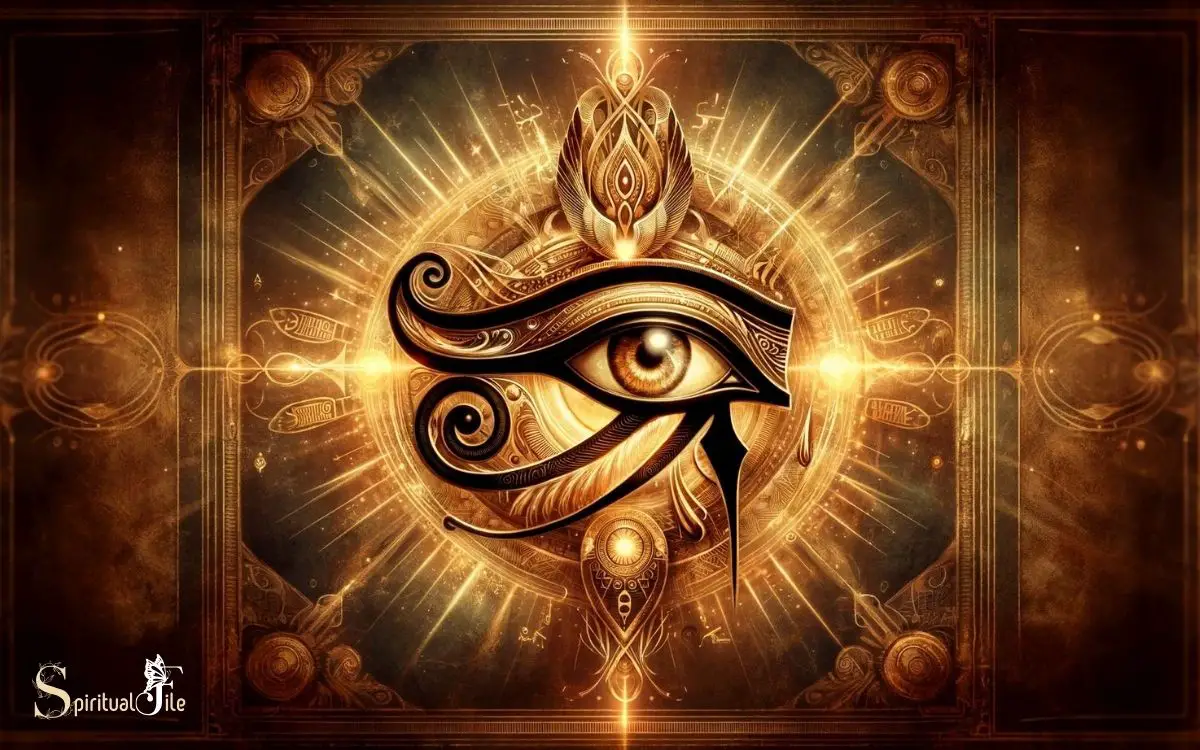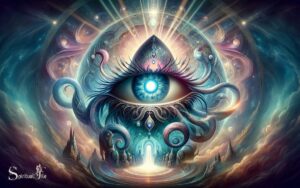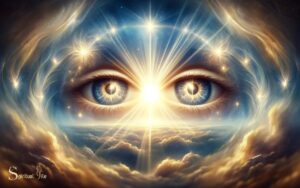Eye of Horus Meaning Spiritual: Protection!
I’ve always been fascinated by the Eye of Horus and its spiritual meaning. For many, this ancient Egyptian symbol represents protection, healing, and insight. Its origins date back to ancient Egypt, where it was believed to embody the power and wisdom of the falcon-headed god Horus.
As I delved deeper into its symbolism, I discovered its profound spiritual significance and interpretations in various belief systems.
From its connection to Egyptian mythology to its relevance in modern spirituality, the Eye of Horus continues to hold a special place in the hearts of those seeking spiritual guidance and enlightenment. Join me as we explore the rich spiritual meaning behind the Eye of Horus.

Key Takeaway
Origins of the Eye of Horus
The origin of the Eye of Horus can be traced back to ancient Egyptian mythology and symbolism. As a symbol, it represents protection, royal power, and good health. According to the myth, Horus, the sky god, lost his left eye in a battle.
Thoth, the god of wisdom, magically restored it. The eye became a symbol of healing, protection, and sacrifice. It was also associated with the sun and the moon, representing the waxing and waning cycles.
The Eye of Horus was believed to have protective and healing properties, and it was often used in amulets and jewelry.
Its significance extended beyond the mythological realm and became a part of ancient Egyptian funerary rites, where it was believed to assist the deceased in the afterlife.
Symbolism in Ancient Egypt
I’ll start by exploring the symbolism of the Eye of Horus in ancient Egypt. This symbol was a powerful representation of protection, often associated with the divine feminine and the nurturing aspects of the goddess.
Understanding its connection to Horus, the sky god, sheds light on its spiritual significance within ancient Egyptian culture.
Eye of Protection
As an ancient symbol of protection in Egyptian culture, the Eye of Horus holds significant spiritual and mystical meaning. The Eye of Horus, also known as the Wedjat or the “all-seeing eye,” was believed to have protective powers against evil forces.
It was commonly used in ancient Egypt to ward off negative energy and bring good fortune to the wearer. The symbol was also associated with healing and restoration, as it was believed to possess the ability to bring about physical and spiritual healing.
The Eye of Horus was often worn as an amulet or used in funerary rites to ensure safe passage into the afterlife. Its enduring presence in Egyptian art and culture underscores its enduring significance as a powerful protective symbol.
Divine Feminine Symbol
Exploring the Eye of Horus as a divine feminine symbol reveals its significance in ancient Egyptian symbolism.
In ancient Egypt, the Eye of Horus represented the divine feminine in various aspects, symbolizing protection, healing, and fertility.
Here’s how the Eye of Horus embodies the divine feminine:
- Protection: The Eye of Horus was believed to have protective qualities, particularly associated with the goddess Wadjet, who was a symbol of protection and the divine feminine.
- Healing: The Eye of Horus also signified healing and restoration, reflecting the nurturing and compassionate aspects of the divine feminine.
- Fertility: In ancient Egyptian belief, the Eye of Horus was linked to fertility and the regenerative powers of the feminine principle.
- Nurturing: The Eye of Horus symbolized the nurturing and caring nature of the divine feminine, providing sustenance and support.
Connection to Horus
Understanding the symbolism of the Eye of Horus in ancient Egypt, I frequently find that its connection to Horus embodies profound spiritual significance. In Egyptian mythology, Horus was revered as a sky god, embodying kingship, protection, and the all-seeing eye.
The Eye of Horus, also known as the Wedjat Eye, is often associated with healing, restoration, and protection. It symbolizes the eye lost by Horus during his battle with Seth, later restored by the god Thoth.
This restoration represents healing and the triumph of good over evil. The Eye of Horus also holds significance in the afterlife, where it was believed to assist in the journey to the underworld.
This connection to Horus reflects the ancient Egyptians’ reverence for divine protection, restoration, and the enduring battle of good and evil.
Spiritual Significance and Interpretations
The spiritual significance and interpretations of the Eye of Horus hold deep meaning in ancient Egyptian mythology and continue to resonate with individuals seeking insight and spiritual guidance.
When exploring the spiritual aspects of the Eye of Horus, several key interpretations come to light:
- Protection: The Eye of Horus is often seen as a symbol of protection, warding off evil and negative energies.
- Healing: It is associated with healing and restoration, offering hope for those in need of physical or emotional healing.
- Clarity and Insight: The eye represents clarity of vision and insight, guiding individuals towards truth and understanding.
- Connection to the Divine: It signifies a connection to the divine realm, serving as a reminder of the presence of higher powers in our lives.
These interpretations provide a profound insight into the spiritual significance of the Eye of Horus, offering guidance and reassurance to those who seek it.
Connection to Egyptian Mythology
I’ve always been fascinated by the rich mythology of ancient Egypt, and the Eye of Horus holds a prominent place in this intricate belief system. The symbol’s connection to Egyptian mythology is deeply rooted in the ancient culture’s spiritual beliefs and rituals.
Understanding this link can provide valuable insight into the enduring significance of the Eye of Horus in modern spiritual practices.
Symbolism in Modern Culture
In modern culture, my fascination with the eye of Horus stems from its deep connection to Egyptian mythology.
The symbolism of the eye of Horus continues to resonate in various aspects of modern society, such as:
- Protection: The eye of Horus is often seen as a symbol of protection, and it is not uncommon to find people wearing jewelry or tattoos featuring this ancient symbol as a way to seek protection in their daily lives.
- Inspiration in Art: Many artists draw inspiration from Egyptian mythology, incorporating the eye of Horus into their artwork to convey ideas of protection, insight, and wisdom.
- Pop Culture References: The eye of Horus frequently appears in movies, video games, and literature, adding an air of mystique and ancient wisdom to modern storytelling.
- Jewelry and Fashion: The eye of Horus has become a popular motif in modern jewelry and fashion, with many people incorporating it into their personal style as a symbol of spirituality and protection.
This enduring connection to Egyptian mythology demonstrates the lasting impact of ancient beliefs and rituals on contemporary culture.
Ancient Beliefs and Rituals
Exploring the ancient beliefs and rituals of Egyptian mythology reveals a rich tapestry of spiritual practices and symbolic significance. The eye of Horus, also known as the Wedjat eye, held profound importance in ancient Egyptian culture.
It was a symbol of protection, royal power, and good health. The myth of Horus, the falcon-headed deity, and his battle with Seth, the god of chaos, is deeply intertwined with the significance of the eye of Horus.
Ancient Egyptians believed that the eye of Horus had the power to ward off evil and bring blessings. Rituals involving the eye of Horus were conducted to invoke its protective and healing properties.
These ancient beliefs and rituals offer a fascinating glimpse into the spiritual worldview of the ancient Egyptians and the enduring significance of the eye of Horus.
The Eye of Horus in Modern Spirituality
My understanding of the Eye of Horus in modern spirituality has been shaped by its significance as a symbol of protection and healing.
In today’s spiritual context, the Eye of Horus holds various meanings and applications:
- Protection: Many people see the Eye of Horus as a powerful symbol of protection against negative energies and harm.
- Healing: It is also commonly associated with healing, promoting physical, emotional, and spiritual well-being.
- Awareness: In modern spirituality, the Eye of Horus is often used to promote awareness and mindfulness, helping individuals stay connected to their inner wisdom.
- Connection to Ancient Wisdom: People often turn to the Eye of Horus as a way to connect with ancient Egyptian wisdom and incorporate it into their spiritual practices.
Practices and Rituals Involving the Eye of Horus
One common practice involving the Eye of Horus is the use of amulets or jewelry adorned with its symbol for protection and healing.
These items are believed to carry the protective and healing powers of the Eye of Horus and are often worn or carried as a symbol of divine health and safety. Another ritual involving the Eye of Horus is the use of its symbol in meditation and visualization practices.
Many practitioners visualize the Eye of Horus as a source of protection and insight during meditation, using its imagery to gain clarity and to ward off negative energies.
Furthermore, the Eye of Horus is often incorporated into ritualistic ceremonies, where its symbol is invoked for protection, healing, and spiritual guidance.
| Symbol | Meaning |
|---|---|
| Right Eye | Solar energy, protection, and good health |
| Left Eye | Lunar energy, intuition, and wisdom |
| Eyebrow | Thought and mental clarity |
Conclusion
As I delved into the spiritual meaning of the Eye of Horus, I was captivated by its ancient origins and deep symbolism.
The juxtaposition of its connection to Egyptian mythology and its presence in modern spirituality is truly fascinating. It’s amazing to see how this powerful symbol has transcended time and continues to inspire spiritual practices and rituals today.






